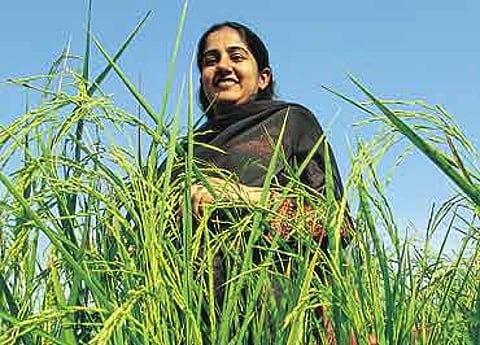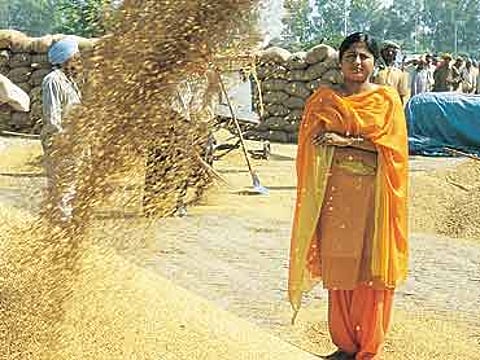Take Ruhi Nijjer, 29, the youngest daughter of a prosperous Amritsar farmer. She has no brothers and her older sisters are married. So after graduation, she began helping her father on their 200-acre farm. Today, she has taken over virtually all operations and her doting father says, "She is more than a son for me." But Ruhi chimes in: "He probably never imagined I'd take over so much." In fact, from the 70 acres they were cultivating when Ruhi began farming, today their farm has expanded to 200. Handling their 100-strong labour force is Ruhi's main responsibility. The Nijjers grow potato, tomato and some paddy. Ruhi supervises the planting, harvesting, grading and packing of the produce:". We send our seed potatoes to Calcutta, Gujarat and Bangalore.While all this is being done, one has to be out there, right till the time when the trucks are loaded for dispatch. Farming is a 24-hour job," she laughs.
If farming as a career for women is still unconventional, what would one make of a woman as a commission agent, better known as the 'arhtiya' in Punjab? The relationship between the farmer and the arhtiya is an intimate one. The latter lends money to the farmer through thick and thin, helps him market his produce and is the go-between the farmer and the buying agencies. Manita Kurl, 30, of Mahailgaila in Nawanshahr district, is the only woman commission agent in all of Punjab. "When my father died, leaving us two sisters and my mother behind, people began saying, 'Oh, the old man's business is finished. There is no one now, to run it'. Those remarks really rankled. Both my sister and I are well-educated. I had just landed a lecturer's job in Nawanshahr when my father died. I am preparing to do a PhD as well," Manita told Outlook. "Then just a few days before my father died, he was getting the verandah of his shop extended. A passing villager commented, 'Kurl sahib, why are you wasting money on this, one day it will come to us.' That really hit me. I mean, people were passing these comments, just because my father did not have any sons!"
Hardy Tesses
Patriarchy's golden fields ripple under an interesting new threat



Now, Manita sits in the Banga grain mandi, procuring paddy or wheat from her faithful band of farmers, commanding instant respect. "She's one smart commission agent. Her business is good. We do sometimes feel uncomfortable when she sits till the wee hours of morning during season, but she manages her labourers well," says Sarwan Singh, a fellow arhtiya.
Though women have torn down the fences within traditional farming families over whether girls should take to managing the family farm, there's still a huge gap between managing the land and inheriting it. The idea of a woman having land in her own name is something rural Punjab is still uneasy with. It's okay to have a woman in the tractor's driving seat, maybe even flying a plane low over his field, but to be a man here is to be lord of his fields. This is why Rimpy's mother is worried that her daughter hasn't learned the basics of housekeeping, as she has to get married one day. They are looking towards Rimpy's 10-year-old younger brother to take charge once he grows up. As for Rimpy, "I want to join the Punjab police. Already I have qualified for the kabaddi state level championship and hope to get into the police in the sports quota. I can't give up farming entirely as it's in my blood, but I have to move on."
Ruhi, on the other hand, got married this year after a long search because, as her father put it, "Her one condition was that her husband should be in the merchant navy, and would be away sailing for half the year leaving her free for farming, and that the boy should be from nearby Amritsar." So, even though she is expecting their first baby, Ruhi drives the 20-odd km from her in-laws' house in Amritsar town to her farm everyday. "If there is more work to be done, I stay overnight but generally get back in the evening. I have no intentions of giving it all up just because I'm married."
That mindsets are changing in rural areas is evident from the support Manita got from fellow villagers and colleagues. "This being a Doaba area of Punjab, where many families have migrated abroad, people are fairly liberal," says Sarwan. Manita's first priority though is to get her younger sister married off. "Even if I don't find a suitable man who accepts my work and doesn't look to my business as his livelihood, it's alright with me," she says with a shrug. She has found her calling in life.
Tags